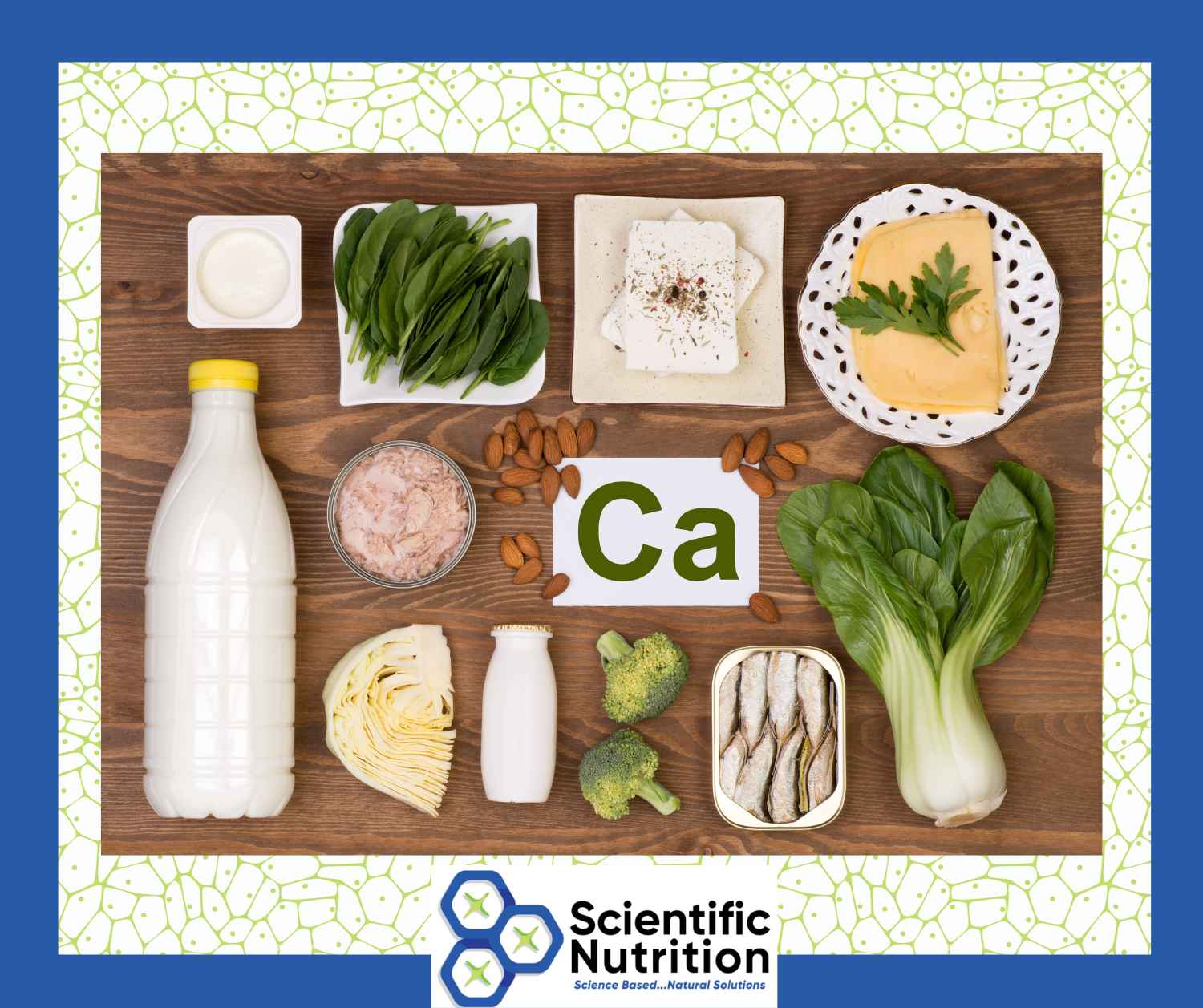The essential role of Calcium in your body
Many people think that calcium is just about strong bones and teeth (although it’s pretty great at that). It’s more than that.
It’s the maestro behind your muscle contractions, the conductor of nerve transmissions, and even the prompter for your blood when it’s time to clot. Without calcium, your body would fall out of balance.
Have you ever eaten a food without salt? Yes! That tasteless food. That’s how your body feels without having proper calcium ingredients in healthy recipes.
This blog will show you:
- what functions does this mineral do in your body
- what if you’re getting excessive amounts
- how it affects you mentally, physically, and emotionally when you don’t take calcium seriously
Why Calcium is a vital mineral?
It is the 20th element on the periodic table, and its scientific symbol is Ca. What makes it stand out is its remarkable versatility. Calcium is crucial in various biological processes when your body needs it. It is the most abundant mineral in your body.
Approximately 99% of it is found in your bones and teeth. This abundant presence ensures the strength and structural integrity of your skeletal system. However, it isn’t limited to your bones; the remaining 1% is distributed throughout your body.
This small but critical fraction circulates in your bloodstream, muscles, and nerves, where it performs essential functions. It is a calming mineral and can “patch” microscopic cuts in arteries while they heal.
The abundance of calcium reflects its significance in maintaining your overall health. It’s a mineral your body relies on extensively to support numerous physiological processes, making it an indispensable element for your well-being.
What function does Calcium perform in the body?
a. Bone structure and Ca mineral levels
As mentioned Calcium makes your bones and teeth strong.
Here is all the chemistry simplified: Your bones contain a calcium compound called hydroxyapatite. This compound forms an unshakeable framework that gives your bones their strength. The charged particles of calcium (Calcium ions) are essential for maintaining this hydroxyapatite structure.
When you consume your energy daily, tiny amounts of calcium are continually deposited and borrowed from your bones. This dynamic process, called bone remodeling, ensures your bones remain dense and resilient. Calcium supports this cycle. It helps in keeping your skeleton strong and resilient throughout your life.
b. Muscle contractions and nerve function
When your brain signals a specific muscle to contract, calcium ions get into action.
They kick-start the process, acting like an active messenger. Your muscle has Ca ions stored in small protein units. These Ca ions help you move, lift, and do all your favorite activities.
Similarly, calcium ions are key in transmitting electrical impulses in nerve cells. When a nerve signal needs to jump from one cell to another, calcium ions rush into the nerve cell, stimulating the release of neurotransmitters. These neurotransmitters are like the couriers that carry the signal to the next nerve cell. It ensures smooth communication throughout your nervous system.
b. Blood clotting
We all know that copper and iron play a role in healthy blood functions but did you know Calcium does too?
When you get a cut or injury, your body springs into action to stop the bleeding. Platelets, small cell fragments in your blood, rush to the injury site. Calcium is a glue that helps these platelets stick together and form a plug, sealing the wound. This initial plug is strengthened by a complex cascade of proteins, which rely on this important mineral to function properly.
So it plays a key role in this blood clotting, a vital defense mechanism that prevents excessive bleeding when you’re injured. In this sense, this amazing electrolyte and mineral acts as a healer.
c. Cell signaling
Calcium acts as a messenger, helps transport essential signals and regulates many cell processes. Ca signaling influences muscle contractions, hormone secretion, cell growth, and gene expression. Wow right?
d. Enzyme activation
This mineral is also a critical co-factor for numerous enzymes, acting as a helper in biochemical reactions.
Enzymes speed up chemical reactions in your body. These reactions are the building blocks of life. They regulate digestion, energy production, and countless other functions. Ca ensures that these processes run smoothly, supporting overall health and vitality.
The consequences of Calcium imbalances
Moderation is the balance in everything. There are different symptoms and issues that may arise if you are either too high or too low in this important electrolyte. Let’s break them down!
What if you intake or have an excessive Calcium level?
They say excess of anything is bad. No matter how important this mineral is, if you’re taking it excessively, you will face consequences. This is toxicity or a shell pattern reflecting as an eggshell type of coating on the outside of your cells. One could feel unnaturally less emotional or disconnected.
Here are 4 major issues you want to avoid;
1. Kidney problems:
Excessive calcium in the diet can overload the kidneys. Kidneys have to work hard to filter extra calcium from the bloodstream. That’s when your kidneys struggle. After some time, it causes the formation of kidney stones, which are painful mineral deposits that can block urine flow.
2. Gastrointestinal issues:
If you randomly face problems like constipation, bloating, and abdominal pain, you might be taking a surplus of calcium. It can irritate the gastrointestinal tract. This is because unabsorbed calcium can bind to other substances in the gut, interfering with normal digestive processes.
3. Impaired nutrient absorption:
Exposure to a higher calcium intake for long periods may hinder the absorption of other essential minerals like magnesium, iron, and zinc. This can disrupt the balance of nutrients in your body, potentially leading to deficiencies in these vital minerals.
4. Kidney stone formation:
Excessive calcium intake combines with other substances in your urine, such as oxalate or phosphate, to form kidney stones. These stones can be excruciating and may require medical intervention to remove.
What if you have Calcium deficiency?
Not giving your body enough daily shows its harmful effects. It increases your risk of certain health conditions. Here’s a breakdown.
Physical symptoms of Calcium deficiency:
Muscle cramps:
Deficient amounts can cause muscles to contract and cramp more easily. It leads to discomfort and pain.
Brittle bones:
Ca deficiency can weaken bones over time. It makes them more susceptible to fractures and breaks. Without adequate amounts of Magnesium and Vitamin D, it will not be utilized to make new bone.
Numbness and tingling:
Low levels may affect nerve function. It results in sensations of numbness and tingling in the extremities.
Conditions associated with severe Calcium deficiency
Osteopenia:
This is a loss of bone mineral density (BMD) that is a precursor to Osteoporosis. I. It can begin after the age of 50 and is a midpoint to the full-blown Osteoporosis diagnosis.
Osteoporosis:
Prolonged calcium deficiency can lead to osteoporosis. It is characterized by weakened and porous bones, increasing the risk of fractures or breaks.
Hypocalcemia:
In severe cases, calcium deficiency can result in hypocalcemia. It is a condition marked by dangerously low levels in the bloodstream. This can lead to muscle spasms, heart rhythm abnormalities, and other serious health issues.
This may also indicate your cellular storage is too low to borrow from to keep your blood in homeostasis or normal.
What are the Risk Factors for Calcium Deficiency?
Dietary Insufficiency:
A diet low in calcium-rich foods, such as dairy products, leafy greens, and fortified foods, can increase the risk of deficiency. Targeted supplementation can help you to fill in the nutritional gaps.
Age:
Your body’s ability to absorb calcium from the diet diminishes as you age. It makes older adults more prone to calcium deficiency. This would require higher amounts to rebuild the cellular savings to draw from when it is needed.
Certain Medical Conditions:
Conditions like lactose intolerance, Celiac Disease, or chronic kidney disease can impair absorption or increase calcium loss. They elevate the risk of deficiency so the appropriate supplements are a must.
Final thoughts;
Just as a balanced diet is essential for your health and bodily functions, getting adequate amounts in the form of food and supplements is vital to keep you healthy and fit.
If you’re the one who, no matter what, never compromises on health, then you should watch your intake carefully. You can measure it accurately on a Hair Mineral Analysis test to monitor your individual needs.
If you feel that you have mistreated your body with calcium, please take your control back. But if things are out of your hands, as an expert Nutritional Consultant I’m just a message away.
LET’S CHAT about your health journey on a complimentary consultation.
Copyright Scientific Nutrition, LLC 2023




